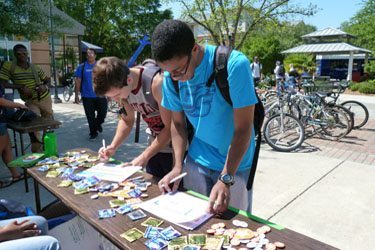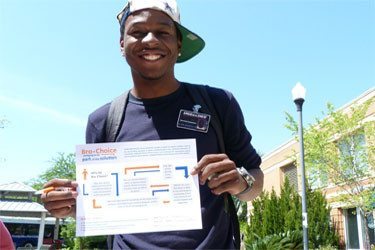Inside the Bro-Choice Campaign: Giving Men the Green Light to Step Up for Reproductive Justice
"Reproductive justice isn’t just a women’s issue; it’s a people issue."

It’s no secret that reproductive rights are often coded as “women’s issues,” and the face of advocacy tends to be feminine. However, since reproductive oppression affects both women and men, and is experienced by women and men, it has been routinely argued that advocates need to do a better job integrating men into the movement. Recently, youth-centered reproductive rights organization Choice USA launched a campaign called Bro-Choice to do just that.
Rewire spoke with Choice USA Executive Director Kierra Johnson to learn more about the campaign.
Rewire: When I hear Bro-Choice, I think: The more men working for abortion rights and healthy sexuality, the better. But not everyone might get that. Why is it important to draw in and lift up young men in the reproductive justice movement?
Kierra Johnson: No one can win alone. We strongly believe that the more people (including men) working for reproductive justice, the better. Without substantively and authentically incorporating men of color, low-income men, young men, gay men, transgender men, and, yes, white straight men, how can we expect to shift a paradigm toward true gender justice? When we don’t engage men in strategic ways, we miss out on opportunities for new ideas and perhaps new solutions to old problems.
Reproductive oppression affects everyone. Men can serve our movement in better ways than as pantomime allies. Men are directly impacted by sexual and reproductive health policies set at the local, state, and national level. Men and boys are survivors of sexual assault. There should be a bigger spotlight on men who are already doing cutting-edge work to interrupt the cycle of violence and misogyny in their communities so that we can learn from and replicate what is working.
We all stand to gain a lot by together redefining and embracing healthy visions of masculinity. But that can only begin to happen when men have the space to discuss, unpack, and grapple with how they benefit and are hurt by traditional stereotypes, expectations, and cultural norms associated with modern-day concepts of masculinity.
We all deserve a new frame where we get to see men as a part of the solution and not just the problem. And so many of them want to be a part of the solution; young men are pro-choice and they care about ending violence. There are so many young men who right now who are passive supporters of reproductive justice simply because they aren’t sure how they can be active.
Rewire: So what is the long-term vision for the Bro-Choice campaign?
KJ: We hope that this program can catalyze the men who aren’t yet, but want to be, speaking out on sexism and rape culture. We want to inspire them to become active stakeholders in the fight against sexual assault. We also want to work with them to figure out the appropriate roles to play in fighting for abortion rights, contraceptive access, and the right to strong families. It is true that more men are interviewed about abortion than women. As long as that’s the case, the short-term goal is to get more pro-choice men in front of the camera and legislators. The long-term vision is cultural revolution! We want to do our part to support women and men working to prepare young people of all genders to be ambassadors for sexual health, reproductive rights, and communities free of sexual violence.
Rewire: Let’s back up to the beginning of this campaign. Last year you hosted a Bro-Choice panel discussion that led to the creation of a more formal campaign. Tell me about the themes that came up in that first discussion, and how you knew there was more to explore.
KJ: This idea came out of two separate conversations students were having with us simultaneously. Women in our chapters were looking for ways to authentically engage men on campus, and men were looking for opportunities to work on issues that impact their friends, partners, classmates, and selves. So the original panel, named by students, was held more than a year ago to talk about engaging men in reproductive rights and the challenges of that. After that conversation we knew that there were a lot of people thirsty to talk about these subjects, so the one discussion turned into a series of panels. Then, after so many horrendous episodes of sexual assault drew national attention, it’s evolved into a broader conversation about masculinity and sexual assault.
The national conversations that have happened in the wake of Steubenville are so important, but we’re not sure they are reaching the people that need to hear it most.
Men and gender non-conforming people are affected by these issues and care about these issues. We want to see changes on campuses and in the culture that embrace many ways to “be a man.” We want to see colleges and universities taking sexual assault seriously and eradicating rape culture and victim blaming. We want to see all types of gender identities and expressions respected. Obviously these are very big goals, but we hope that by starting these conversations with Bro-Choice we can be one small part of making them a reality.
Rewire: Choice USA works with a lot of students. What kind of issues do you see resonating with young men on campus, and why?
KJ: Students everywhere are taking action against epidemic levels of sexual assault on campuses and the perceived indifference of administrations and law enforcement. Young people are fired up about this. And we talk to many young men who recognize the sexism and rape culture operating on their campus and in their social circles—even if they wouldn’t use those terms.
Environmental rights, the school-to-prison pipeline, voter disenfranchisement, racial profiling, LGBTQ rights, and education access are also all issues that young progressive men are talking about on college campuses. While Bro-Choice is a relatively new campaign, we are excited at the possibility of working with men and women who are passionate about all of these issues to find some new, creative work at the intersections.
Rewire: So is this any different from young women’s activism against sexual oppression? Are there differences in approaches or issues that we should be aware of as we work to build a more inclusive movement for reproductive justice?
KJ: Reproductive justice isn’t just a women’s issue; it’s a people issue. And organizing and advocacy is about meeting people where they are. To do that, you cannot make any part of a person’s identity invisible. You have to be willing to see them, hear them. Even when it is hard and painful, and especially when you disagree or when you are uncomfortable.
Organizing with men is no different.
But that doesn’t mean that male-identified folks joining the Bro-Choice campaign will always find this advocacy easy. Examining gender roles in pursuit of reproductive justice challenges ideas so deeply ingrained in our culture that they are invisible to most. Those who choose to do so may find that they need to step back and listen at times. It won’t always be comfortable, but that’s really true of all social justice work when it’s done right.
Women have been the champions of issues that affect both men and women for decades: sex education, family leave policies, sexual assault, and more. Women are uniquely impacted by these issues, and they should continue to be advocates. It will always be appropriate and necessary for women to be visible and vocal leaders in this work. Women will always need to be true mentors and guides of new activists and leaders entering into this work. But we hope Bro-Choice will offer a new point of entry that gives men the green light to engage more actively with us in the fight for justice for all.
Rewire: It was recently Bro-Choice Week, and eight of your student chapters took action. What are some examples of what they did?
KJ: Our students did organizing at eight schools in four states (the University of Kansas, Ohio State, Georgia Southern University, Sacramento State, Cal State Long Beach, Cal Poly, Colorado College, and Stanford). Each of them did different things, mostly discussion events, panels, and tabling. Most of them did events where they could talk honestly about issues facing men who want to get involved with reproductive justice and sexual assault prevention. They also collected Bro-Choice pledges, and throughout the week we had almost 500 people sign the Bro-Choice Pledge.
Rewire: How were these actions received on campus? What can we all learn from these experiences?
KJ: Our students had great reactions to these events on campus. At Georgia Southern University we have a new chapter that has been having some trouble getting traction on campus. They teamed up with their Gay Straight Alliance and held a discussion event, which had a huge turnout—they got 75 new members in one day! Our chapter at Cal Poly also held a discussion event, and they intentionally reached out to groups that were not the usual targets to attend: the Greek community, sports teams, and the gym. They had about 50 people show up and were able to have a very honest, open conversation with these young men. Our chapter leader there described the way that many of the men seemed to be expressing out loud for the first time the pressures they felt and the discomfort they sometimes have in their social circles.
I think the real lesson here is that there are so many young men who are hungry to have the conversations and have a safe place to talk openly about masculinity, sexuality, and violence; even those who seem like the most unlikely suspects for this campaign are finding value in it.
Rewire: Tell us about the other actions Choice USA led online during Bro-Choice Week. What kind of reactions have you been getting to the campaign online?
KJ: Online we held a blog series and some social media elements, including a Twitterstorm and Facebook images. We saw huge numbers of people engaged with us through these avenues, and tons of great discussions were sparked. We saw some of the same discourse that played out in micro settings also play out as the week of action rolled out last month. Some people are excited to see the campaign and are eager to participate; others are triggered at the suggestion that men take on active visible roles in fighting for contraceptive access, abortion policy, and for better responses to violence on and off campuses. Generally, people seem comfortable coming to the table with their passion and having real conversations.
Rewire: So what’s the next step, if you’re ready to tell us?
This summer we’ll be hosting our national membership conference, and chapter leaders from all over the country will come to D.C. to plan this and other campaigns for the 2013-14 academic year. We plan to roll out a public education campaign in the fall that we hope will be fun and impactful in changing attitudes and campus policies regarding sexual assault.
We will also be reaching out to people who signed the Bro-Choice Pledge as we roll out that phase with ways to get involved.
Rewire: What should readers do if they want to get involved? Anything else we should know?
KJ: The best way to get involved is to sign the Bro-Choice Pledge and declare that you want to be part of the solution to work toward reproductive justice and ending sexual violence.
